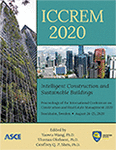International Conference on Construction and Real Estate Management 2020
Quality of Time-Dependent Data Segments of Experiments on Thermal Sensation Using Immersive Virtual Environments
Publication: ICCREM 2020: Intelligent Construction and Sustainable Buildings
ABSTRACT
The aim of this study is to study the effect of various time dependent data segments on an occupant's environmental sensation and physiological responses in both real environment (in situ) and immersive virtual environment. The study included a series of human subject experiments with 27 participants in a climate chamber. The indoor temperature was varied between 65°F, 75°F, and 85°F. Heart rate, galvanic skin response, skin temperatures of the eight selected body areas were measured in combination with a thermal sensation and comfort survey. The data was divided into four segments based on time, i.e., full data, data of 5 minutes before a temperature change, data of 7 minutes before a temperature change, and data of 10 minutes before a temperature change. Independent sample T-tests were performed between the four segments at each step temperature. Results of this study revealed that once the chamber indoor temperature is stabilized, the quality of measured physiological data are not subject to the time period that the data are extracted for analysis.
Get full access to this article
View all available purchase options and get full access to this chapter.
ACKNOWLEDGEMENT
This research was supported by the NSF grant CBET-1805914. Any opinions, findings, and conclusions or recommendations expressed in this material are those of the author(s) and do not necessarily reflect the views of the National Science Foundation.
REFERENCES
Allen, J.G., MacNaughton, Satish P., Santanam, U., Vallarino, S. and Spengler, J. (2016). “Associations of cognitive function scores with carbon dioxide, ventilation, and volatile organic compound exposures in office workers: a controlled exposure study of green and conventional office environments.” Environmental Health Perspectives, 124(6), 805-812.
American Society of Heating, Refrigerating and Air-Conditioning Engineers (ASHRAE). (2013). Standard 55-2013-Thermal environmental conditions for human occupancy, Atlanta, Georgia.
Bluyssen, P.M., van Zeist, F., Kurvers, S., Tenpierik, M., Pont, S., Wolters, B., van Hulst, L. and Meertins, D. (2018). “The creation of SenseLab: a laboratory for testing and experiencing single and combinations of indoor environmental conditions.” Intelligent Buildings International, 2018(10), 5-18.
Darian, I. and Johnson, K. O. (1977). “Thermal sensibility and thermoreceptors.” Journal of Investigative Dermatology, 69(1), 146-153.
Kidd, C.D., Orr, R., Abowd, G.D., Atkeson, C.G., Essa, I.A., MacIntyre, B., Mynatt, E., Starner, T.E. and Newstetter, W. (1999). “The aware home: a living laboratory for ubiquitous computing research.” Second International Workshop on Cooperative Buildings, Integrating Information, Organization and Architecture, Pittsburgh, U.S., 191-198.
Liu, H., Liao, J., Yang, D., Du, X., Hu, P., Yang, Y. and Li, B. (2014). “The response of human thermal perception and skin temperature to step-change transient thermal environments.” Building and Environment, 2014(73), 232-238.
Matsumoto, T., Miyawaki, T., Ue, H., Kanda, T., Zenji, C. and Moritani, T. (1999). “Autonomic responsiveness to acute cold exposure in obese and non-obese young women.” International journal of obesity, 23(8), 793.
Peltola, M. (2012). “Role of editing of R-R intervals in the analysis of heart rate variability.” Frontiers in Physiology, 3(148), 1-10.
Saeidi, S., Zhu, Y., Choi, J. H., Zhong, C. and Wang, Q. (2016) “Immersive virtual environment as an apparatus for occupant behavior studies.” International Conference on Construction Applications of Virtual Reality, Hong Kong, China, 581-592.
Schiavon, S., Yang, B., Donner, Y., Chang, V.W.C. and Nazaroff, W.W. (2017). “Thermal comfort, perceived air quality, and cognitive performance when personally controlled air movement is used by tropically acclimatized persons.” Indoor Air, 27(3), 690-702.
Xiong, J., Zhou, X., Lian, Z., You, J. and Lin, Y. (2016). “Thermal perception and skin temperature in different transient thermal environments in summer.” Energy and Buildings, 2016(128), 155-163.
Information & Authors
Information
Published In
ICCREM 2020: Intelligent Construction and Sustainable Buildings
Pages: 8 - 21
Editors: Yaowu Wang, Ph.D., Harbin Institute of Technology, Thomas Olofsson, Ph.D., Luleå University of Technology, and Geoffrey Q. P. Shen, Ph.D., Hong Kong Polytechnic University
ISBN (Online): 978-0-7844-8323-7
Copyright
© 2020 American Society of Civil Engineers.
History
Published online: Oct 14, 2020
Published in print: Oct 14, 2020
Authors
Metrics & Citations
Metrics
Citations
Download citation
If you have the appropriate software installed, you can download article citation data to the citation manager of your choice. Simply select your manager software from the list below and click Download.
